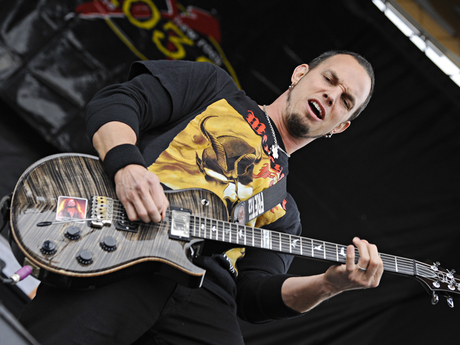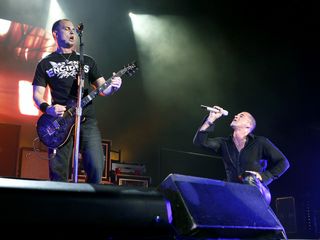

Mark Tremonti and his Creed mates have two big albums to play on tour. © Amy Harris/Corbis
Most bands would be happy to sell six million albums during their entire careers, but Creed nailed that their first time at bat. The group's 1997 debut, My Own Prison, ruled mainstream rock radio and went six times platinum in the US alone, propelling the four Tallahassee upstarts (guitarist Mark Tremonti, singer Scott Stapp, bassist Brian Marshall and drummer Scott Phillips) into arena headliners practically overnight.
The did even better with their next release, 1999's Human Clay, a potent mix of pulverizing guitar riffs, memorable hooks and deeply introspective lyrics, which has moved an astonishing 11 million copies in America, with worldwide sales pushing that number towards the 20 million mark.
To celebrate the 15th anniversary of My Own Prison, Creed are embarking on a North American tour, starting 13 April in Chicago, during which they'll play that album and Human Clay in their entirety on different nights.
"It's a great idea," says guitarist Mark Tremonti. "We've never done anything like this before, and I'm really looking forward to it. Our fans are going to get exactly what they paid for and then some - we'll play the albums, and then we'll probably do seven or eight other songs. And we'll get to travel back in time and feel like kids again."
We sat down with Tremonti (who, along with Marshall, Phillips and singer-guitarist Myles Kennedy have an enviable second career as Alter Bridge) to discuss the Creed tour, what he thinks of the band's first albums, whether the critics ever really bothered him and what changes to his rig he's pondering.
Looking back at My Own Prison and Human Clay, what are your thoughts? Do you love them all the way through, or are there things you wish you could change?
Get the MusicRadar Newsletter
Want all the hottest music and gear news, reviews, deals, features and more, direct to your inbox? Sign up here.
"No, I definitely wouldn't change them. They come from a different mindset. We were very young when we made those records, and the arrangements are a little different from what we might do now, but I wouldn't change a thing. They're right for the time we wrote them, for what they represent."
Do you have any new songs you might test out live?
"We don't have any songs that are completed yet; we have a few things that are in the works. We'd have to really dig into them before we'd try them live - the first time we play a new song, it'll be all over the internet. It's all about putting our best foot forward, you know?"
As for the next album, is there anything you'd like to do differently that you haven't done before?
"I think we tried to do that a lot with Full Circle - you know, taking what we had learned during the seven years we were apart and applying them to what was happening right then. But I think I might go back to some of the ideas I had years and years ago and try to get back in the mindset of the early Creed days, just to see what I can come up with. Maybe I can put some of my new experiences on old ideas."
Do you have demos of songs that didn't make it onto Creed albums?
"Oh, sure. I have stuff sitting around that's from junior high school. [laughs] I just finished my solo record, and one of the songs on it is something I started in seventh or eighth grade. I log all of my ideas. An idea from 15 years ago could be just as good as one from today."
Have you ever listened back to your old tapes and been absolutely horrified?
"Yeah, some of the performances are horrifying, but I can see the big picture - where the songs can be taken, the ideas themselves, the melodic content - and that allows me to dredge up some good material from old ideas."
You touched on this a bit, but can you expand on how playing in Alter Bridge has affected your playing in Creed?
"I think just being a guitar player and trying to improve every year gives you more colors to paint with. I have more experience under my belt and can do more on the guitar than I used to.
"As far as Creed goes, I'm trying to go back to the material and play everything as close to the way it was written. I don't want to get too fancy with the songs. I saw some of our live performances, and I thought that we were improvising parts that were out of place with some of the other stuff. I think that when we do this album touring concept, we'll keep things pretty close to the original versions. If we do things that are a little outside the box, it'll be between songs or during huge chunks in bridge areas."
You, Brian and Scott are in both Alter Bridge and Creed - the only thing that changes is the singer. Does that ever create a strange dynamic at times?
"We've just learned to put 100 percent into whatever it is we're working on. I seem to have this filter for knowing which ideas should go to Alter Bridge and which are right for Creed. We had a big learning curve with Alter Bridge to try to make the band not sound like Creed, so now we have to play that game on both sides.
"When we play with Creed, we're doing songs we wrote when we were pretty much kids, so we feel like we're in a time machine. To me, Creed has more of a commercial appeal, more of a theatrical side to it, whereas Alter Bridge is more of a hard rock kind of thing - it is what it is. But the two bands definitely seem different when you're on stage."
It's no secret that Creed never got much love from music critics. How much of a drag was that for you?
"Well, you know, when you're a kid, you dream of being in a rock band, and you want all the best things - tours, respect from your peers, the critics and the like. You have to take the good with the bad. You get huge success, and there's people right there who want to take it from you. I've seen it time and time again. Creed definitely aren't the first band that this has happened to."
On the other hand, lots of bands that are critics' darlings sell no records.
"Exactly. We've gotten a lot of friendly critical response to the last two Alter Bridge records. You know, you can't have everything. But to get good critics' reactions to Alter Bridge, it's like we have the best of both worlds there."
What's your relationship with Scott Stapp like? The two of you have had your tense times.
"When we get together to play, that's what we do - we're there to play. When we're not playing, we're back with our families and doing other things. Back in the day, we were together all the time, 24 hours a day, sharing the same bus, in the same hotel, the same rehearsal room. You do that year after year, personalities can clash.
"We'll be together a week before doing this tour. We haven't spent a whole lot of time with each other, but we're looking forward to getting out there and doing what we love.
"When we got back together, the best thing was to not bring up the past, the things that were said about each other. We just said, 'Let's not look back, let's move forward.' It wouldn't have worked any other way; it would've been a recipe for disaster."

Tremonti and singer Scott Stapp on stage in West Palm Beach, Florida, 2009. © Sayre Berman/Corbis
Are you using a different kind of rig in Creed than the one you use in Alter Bridge?
"No, it's the same thing, but it's always evolving. I buy guitar amps like women buy shoes. [laughs] I have one coming next week, a Bludotone. There's about a two-year waiting list for them. He's pretty much taken over for building amps for the super-fancy Dumble guys - Robben Ford, Larry Carlton, Carlos Santana. He's a genius.
"I already have a Bludotone, but it's like a piece of furniture. It's wooden - I wouldn't dare take it on the road because it'd get too beat up. But the one I have coming, its shell is cork, so I'll take it out and see how it sounds - if it gets here on time.
"The amps I have now that I haven't tried with my rig, I'll definitely be pulling them out on the road. I have a Cornford RK100 that I used on my solo album to record all the rhythms - I'll pull that out. I also have a Diezel Hagan, so I'll put that in my rig and see how it sounds, too. It takes time to figure out which amp can replace what. Maybe one in 10 amps makes it in."
You just acquired a new Paul Reed Smith baritone guitar. Will you be taking it out, too?
"Yeah, that one just came in. It's a signature model, but it's a one-off baritone. It has my name, so it's made for me; they won't be doing any more versions of it. It was a pretty big deal for them to make it. I'm really psyched - it's absolutely beautiful."
Joe is a freelance journalist who has, over the past few decades, interviewed hundreds of guitarists for Guitar World, Guitar Player, MusicRadar and Classic Rock. He is also a former editor of Guitar World, contributing writer for Guitar Aficionado and VP of A&R for Island Records. He’s an enthusiastic guitarist, but he’s nowhere near the likes of the people he interviews. Surprisingly, his skills are more suited to the drums. If you need a drummer for your Beatles tribute band, look him up.

"It may have bothered him that people didn’t recognise his guitar virtuosity, which might be why the song devotes so much space to his shredding": A music professor breaks down the theory behind Prince's When Doves Cry

“It didn’t even represent what we were doing. Even the guitar solo has no business being in that song”: Gwen Stefani on the No Doubt song that “changed everything” after it became their biggest hit
Most Popular








